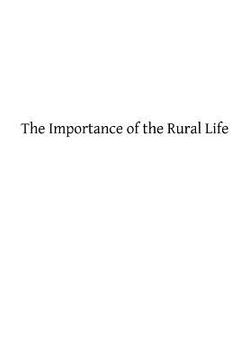The Importance of the Rural Life: According to the Philosophy of St. Thomas Aquinas A Study in Economic Philosophy (en Inglés)
Reseña del libro "The Importance of the Rural Life: According to the Philosophy of St. Thomas Aquinas A Study in Economic Philosophy (en Inglés)"
In the traditional treatment of Thomistic thought agrarian matters have been given little, if any, formal consideration in separate studies. Hence it is to be expected that some, confronted with the title of this dissertation, will be inclined to ask whether the Angelic Doctor gave any thought to agrarian problems, and whether he worked out an agrarian. philosophy. While such questions will undoubtedly .be asked, it is hoped to demonstrate here that there is equal, or stronger, reason to ask the same questions 'with ' the underlying assumption turned about. There is more reason, to assume that. Aquinas concerned himself with agrarian matters than - that he did not. These matters are the philosopher's concern, whose task it is, -according to Aristotle, to order things. More particularly it is the duty of the social philosopher to further good order within the economic and social relations of men. . The land is fundamental. If people are not well ordered in their use of it, it will be of little avail to try to order them in other economic and social matters. The great social philosophers, both before and after Aquinas, have realized this and accordingly have given much attention to the problem in their political economies. For Aristotle there was a close connection between natural wealthgetting from the land and the "good life". The Physiocrats in France and Adam Smith in England gave careful and lengthy consideration to agrarian problems in their political economies. This is to mention only a few. Did then St. Thomas, who lived in an age when the larger part of the economic and social life of the people was carried on in immediate relation to the land and its institutions, fail to include in his comprehensive philosophy the principles by which people might be well ordered in their relation to each other, in matters pertaining to the land? The presumption would seem to be that St. Thomas did treat these matters, and we should therefore have much reason to be surprised if we should find that he had nothing important to say, either directly or by implication, on the rural life. But this reasonable presumption, if it existed, has not been 'acted upon. Of the great number of studies on St. Thomas none has been found that purports to examine his system for the principles of a sound agrarian economic philosophy. This gives the hope that the present study is not only justified but seemingly overdue. The whole method of this study has aimed to bring to bear upon the pressing socio-economic problems of today, not practices from Medieval times, but rather principles from Aquinas' philosophy. The carrying over of the former would represent retrogression; the application of the latter can bring true progress. With this in mind an historical background is included in this study and against this background is exposed the 'Thomistic teaching from a critical examination of pertinent texts. The principles thus discovered are analyzed and applied to the contemporary situation, account being taken of the change in conditions and the causes responsible for it. A careful analysis of these causes is made in order to separate those that have arisen due to a natural progress in the technique of securing material human needs from those that are due to the injection of a false philosophy, whether in good faith or in bad faith, into agrarian life. When this has been done it is more evident that Aquinas' sound agrarian principles are important for the good order of his entire philosophical system and the good order of his times, and that they have, as well, a contribution to make today.

